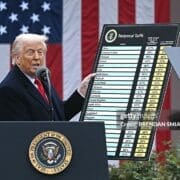By Dr. Isaac Newton
News Americas, NEW YORK, NY, Mon. July 14, 2025: With President Donald J. Trump back in office, his administration has begun re-imposing and expanding tariffs on key imports. Among the most affected are Caribbean economies, which depend heavily on exports to the United States. Jamaica, for instance, has reported a sharp rise in trade costs, with aluminum and bauxite exports now facing up to 17 percent in additional duties. Exporters throughout the region are also confronting increased shipping fees, higher insurance premiums, and longer customs processing times. This is not merely an economic inconvenience. It is a wake-up call. The Caribbean must decide: will we passively endure another cycle of dependency, or will we courageously redesign our economic future?
FLASHBACK: US President Donald Trump holds a chart as he delivers remarks on reciprocal tariffs during an event in the Rose Garden entitled “Make America Wealthy Again” at the White House in Washington, DC, on April 2, 2025. (Photo by BRENDAN SMIALOWSKI/AFP via Getty Images)
The global economy is evolving rapidly. Leadership must now be shaped by global awareness, technological readiness, and strategic foresight. According to the Caribbean Export Development Agency, trade between CARICOM and African nations still accounts for less than four percent of total external trade. This is despite Africa’s population now surpassing 1.46 billion people and witnessing strong gross domestic product (GDP) growth in countries such as Rwanda, Ghana, and Kenya. GDP, which measures the total value of goods and services produced in a country, is a vital indicator of economic opportunity, and Africa is surging.
Some Caribbean nations have started to tap into this potential. Trinidad and Ghana are in formal discussions around energy cooperation. Jamaica, with its global cultural influence, is well-positioned to expand intellectual property partnerships and digital service exports with nations such as Nigeria and South Africa. Barbados is forging climate and finance partnerships with Kenya and Namibia, focused on renewable energy and sustainable development.
This is the moment to finalize trade agreements with the African Continental Free Trade Area, (AfCFTA), the world’s largest single market comprising 54 countries. The Caribbean must also accelerate engagement with MERCOSUR, the Southern Common Market comprising Argentina, Brazil, Paraguay, and Uruguay, and deepen economic ties with the Association of Southeast Asian Nations, (ASEAN), which represents over 600 million people and some of the world’s fastest-growing economies. By doing so, the region can redefine itself as a strategic trade bridge connecting the Americas, Africa, and Asia.
Yet, transformation begins at home. Micro, small, and medium-sized enterprises, (MSMEs) employ more than 70 percent of the Caribbean workforce, yet receive less than 11 percent of total private-sector credit, according to the Caribbean Development Bank’s 2024 report. This financing gap stifles innovation, job creation, and inclusive growth. Guyana’s agro-processing sector, Haiti’s artisan cooperatives, and Saint Vincent’s organic farming initiatives all have untapped potential. To unlock it, CARICOM governments must unite to create a regional development finance institution capable of pooling public and private capital. Targeted funding must be paired with business development services, digital training programs, and simplified tax and regulatory frameworks for emerging enterprises.
We already see proof of progress. In Jamaica, the Lynk digital wallet has registered over 500,000 users since its 2022 launch. It empowers small businesses to receive instant payments and operate without reliance on cash. In Barbados, the Blue Economy Innovation Hub, supported by the Inter-American Development Bank, is nurturing startups focused on marine biotechnology, sustainable tourism, and fisheries. These examples underscore what is possible when public policy aligns with innovation and community priorities.
The region’s infrastructure, however, must catch up. According to the 2025 Caribbean Maritime and Logistics Survey, fewer than 55 percent of CARICOM’s customs and port systems are fully digitalized. The result: excessive paperwork, delays, and inflated logistics costs. Shipping goods from Trinidad to Dominica can take over four days due to manual clearance processes. In contrast, ports in Singapore, the Netherlands, and South Korea process cargo in under 24 hours using streamlined digital systems. The Caribbean must adopt modern e-customs platforms, blockchain-backed export tracking, and harmonized regional standards for trade documentation. This is essential for faster trade, greater transparency, and increased competitiveness.
Even in the region’s most challenging contexts, innovation is taking root. In Haiti, solar-powered cooperatives are supporting rural digital hubs and agricultural startups in regions such as Plateau Central and Artibonite. These centers offer online education, mobile banking, and small business development, all sustained by renewable energy. This proves that, with visionary leadership and strong partnerships, progress is possible even in adversity.
For more than three decades, I have worked alongside governments, faith-based institutions, and international partners across Africa, the Caribbean, and Latin America to reform public institutions and design high-performance systems. Whether advising Liberia’s transitional government, crafting youth empowerment strategies in Antigua and Barbuda, building conflict resolution tools in Saint Lucia, developing change management models in Jamaica, or leading political campaign strategies across the region, or lecturing at our universities on reimagining the future, or preaching and teaching in our faith-based institutions on policy transformation, my mission has remained constant: leadership must serve people and produce systems that endure.
The Caribbean’s moment is now. Tariffs may bruise our trade, but outdated thinking poses a far greater threat. Let us not respond with fear, but with fresh vision. Let us trade not only goods, but creativity, services, and ideas. Let us lead not by clinging to the past, but by preparing our people for the future we are destined to shape.
EDITOR’S NOTE: Dr. Isaac Newton is a Harvard, Princeton, and Columbia-trained expert in change management, public sector reform, and international development. Advisor to governments, faith institutions, and multilateral organizations. Author and keynote speaker on governance, strategy, and leadership for the Global South.




